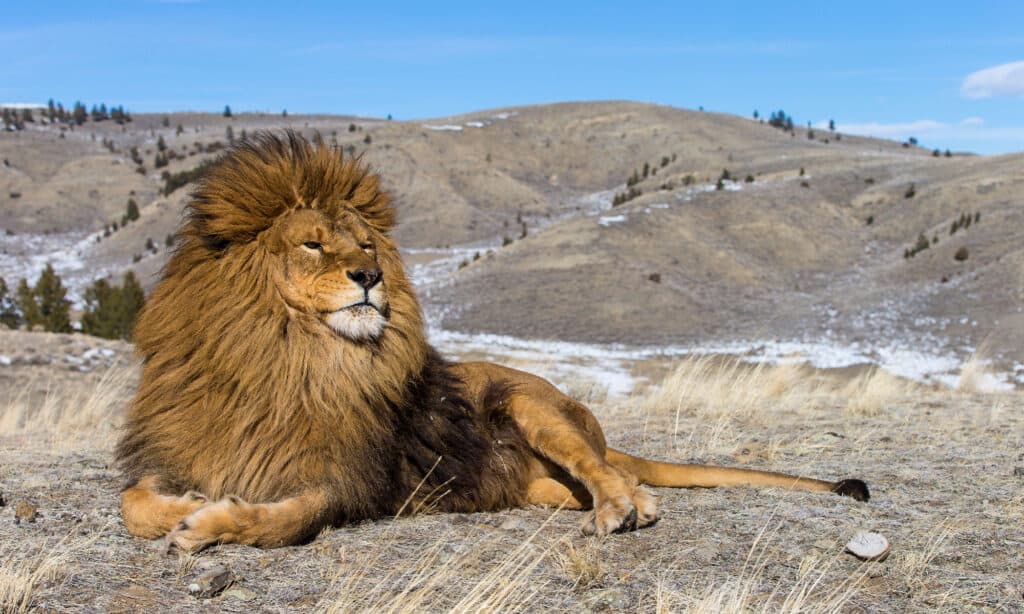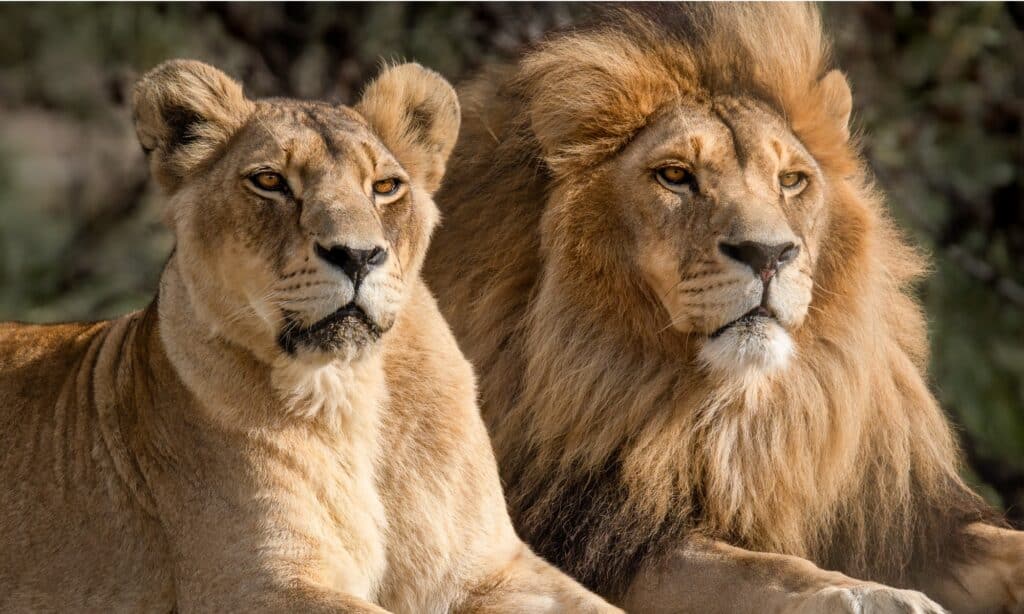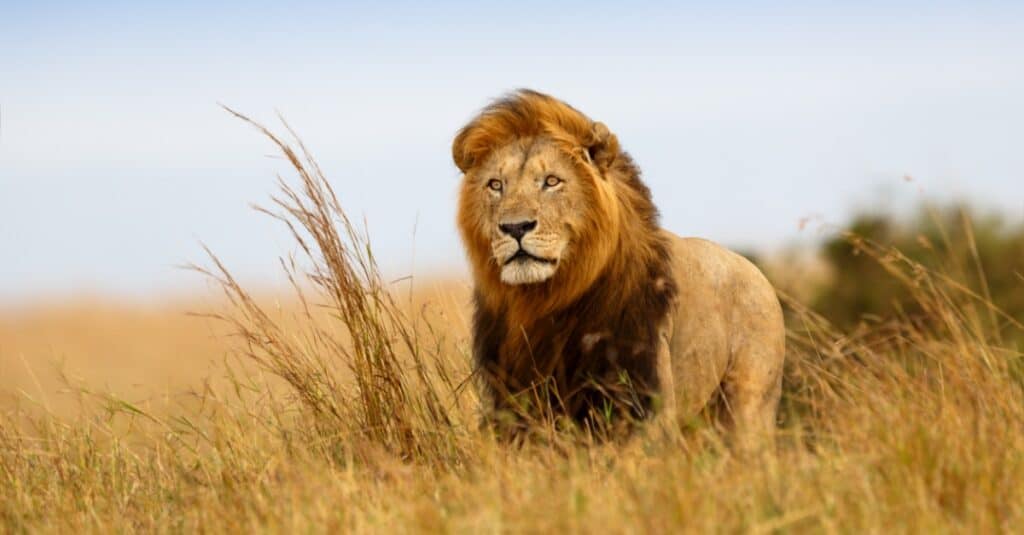Do you know if lions are nocturnal or diurnal? Some people might say that they’re nocturnal. However, lions often hunt during both day and night. So, what’s the answer? Are lions nocturnal or diurnal animals? The answer depends on several factors. Lions can be diurnal and nocturnal, depending on their environment and habits. Let’s explore what this means for their sleep behavior.
Lion Species

Lions are predators, so they adapt their hunting to prey availability in their environments.
©Dennis W Donohue/Shutterstock.com
Most people think of lions as majestic creatures roaming the African savanna. However, the wild lion population also exists on several other continents. Nearly all wild lions live on the African continent, with the majority inhabiting the sub-Saharan region. However, a small population of Asiatic lions exists in western India, around the Gir Forest National Park.
Interestingly, these Asiatic lions are more closely related to those found in west and central Africa than the African lions living in southern and eastern Africa. Regardless of their location or subspecies status, all wild lion populations face significant threats to their survival. Most of these threats come from habitat loss, poaching, and other human activities.
Yet, articles like this one are helpful. They support continued conservation efforts and education about lion populations around the globe. With every piece of information, these extraordinary animals stand a better chance of continuing to exist for generations to come.
The Amount of Time Lions Sleep
Lions are renowned for their ferocity and unrivaled hunting skills. Still, it may surprise many people to learn how much time these majestic predators sleep. According to scientific research, male lions typically sleep for 18 to 20 hours daily. In contrast, female lions usually get around 15 to 18 hours of shut-eye daily. There are a few possible explanations for this difference in sleep patterns between male and female lions. For one thing, the lionesses tend to do more hunting and caring for cubs, and these activities mean they have less time to rest.
Also, studies show that lions sleep more after eating a large meal. Some individuals even sleep up to 24 hours following such a feast. Whatever the reasons for the differences in sleep patterns between males and females, it is clear that even these fearsome predators need plenty of rest when they’re not on the hunt.
Factors Influencing a Lion’s Sleep Habits

Some lions prefer sleeping in elevated areas with good views
©iStock.com/Shawn Levin
When it comes to lions and their sleep habits, the answer is not clear-cut. While many people might assume that these fierce predators are strictly nocturnal animals, with most of their activity occurring at night, the reality is more complex. It all depends on the environmental factors influencing a lion’s daily life.
Lions are known to be highly adaptable creatures and will shift their sleeping behavior in response to changes in their environments. For example, suppose a pride of lions finds itself in an area with limited hunting opportunities at night. In that case, they will often transition into a diurnal state.
This transition could be because, during warmer months, some prey species spend more time foraging during the cooler periods of the day. In that case, the lions will spend more time hunting in the early evening and morning and sleep more during the day’s heat. So, they will change their hunting behavior based on prey availability during their hunting or foraging periods.
Similarly, suppose a pride lives in a particular territory that poses high risks for them at night, such as when humans or other predators pose threats. In that case, lions may limit dangerous nocturnal activities in favor of resting safely through the dark hours.
Whatever specific times of day lions choose for rest or hunting, one thing remains. To survive in their environment, these big cats must be masters of adaptation. As masters, they are flexible enough to change their daily habits accordingly. Ultimately, while lions may exhibit nocturnal behavior much of the time, they are essentially opportunistic more than anything else.
Where Do Lions Sleep?
Lions are mighty predators found in a wide variety of habitats all over the world. When it comes time to rest, however, lions have specific preferences regarding where they sleep. For one thing, lions often seek spots that offer shade from the hot sun. Under the cover of bushes or other natural shelters, these massive mammals can escape the heat and enjoy a well-deserved break from their activities.
Additionally, some lions prefer sleeping in elevated areas with good views. Whether it’s a rise in the savanna grasslands or an outcrop along a riverbank, these locations give them a better vantage point of passing prey, rival predators, or threats. The bottom line is that no matter where they rest, lions know how to optimize their comfort and safety by choosing the right spot to sleep.
The Lions Eye Structure and Vision
Lions have unique eyes that allow them to see in various conditions, including daytime and nighttime. Their large, round pupils are three times bigger than humans, allowing for greater light intake. A second eyelid, or nictitating membrane, helps to keep their eyes clean and protected from debris.
Also, lions have excellent night vision due to unique reflective surfaces in the back of their eyes that concentrate incoming light. With fewer cones than humans that enable color perception, lions only see blue and yellow hues. However, they can see well in low-light situations thanks to their ability to dilate their pupils. These fascinating adaptations make lion eyes an incredible asset for hunting and navigating the wild.
Distance of a Lion’s Visual Capacity

Lions can see up to two miles (eight times more than humans).
©iStock.com/MaggyMeyer
As anyone who has ever gone lion spotting knows, these magnificent predators have remarkably sharp vision. Lions can see up to two miles or more. In contrast, humans see eight times less far than lions. In addition to the specialized tissue that gives them excellent night vision, lions can perceive motion at great distances.
This combination of visual capabilities makes lions exceptional hunters. It allows them to spot prey at long distances and track the target even when it is in motion. Furthermore, lions’ extraordinary vision likely plays an essential role in forming their pride. Their enhanced vision allows these animals to communicate effectively over long distances and coordinate their movements more easily.
Fun Facts About Lions
- Lions are storm chasers: Always opportunistic hunters, lions are constantly testing new strategies. They use the storm’s noise and wind to make it harder for their targets to hear and see them approaching.
- Lions use their hefty weight to their advantage: Some male lion species weigh 419 pounds or more. Typically, the females are smaller and average a more modest 278 pounds. Their massive size and weight give them an edge when hunting large targets. Similarly, this advantage helps them defend their pride against other predators or intruders.
- Juvenile lions are spotty: Adult lions have sleek, sandy-colored coats. Juvenile lions have spotted coats of distinct rosettes rather than flat fur patches like their adult counterparts. Although these spots eventually fade away as the young lion matures, they serve an essential purpose. During the cub’s growth, these spots provide camouflage in their natural habitat to keep them safe.
- A male lion’s mane serves a purpose: As males grow older, their manes become darker and more voluminous. This luxurious mane growth signifies their increased dominance, making them more attractive to female lions. Additionally, these thick manes act as a protective barrier around the lion’s head and neck. This barrier helps to shield them during fierce competition or violent battles with other males.
- A lion’s roar has tremendous significance: Lions are one of only a few known cat species where individuals often roar in unison. They typically engage in this behavior to mark their territory. This roaring lasts about 40 seconds at a time. Impressively, the sound is also so powerful that it can be heard up to five miles away. Additionally, young cubs often join in and practice their roaring by mimicking the sounds of more mature lions.
Nocturnal vs. Diurnal: What’s The Difference?
Navigate to Nocturnal vs. Diurnal: What’s The Difference? for further information about the nocturnal and diurnal phenomenon in various living creatures.
Next Up –
- What Is The Bite Force Of A Lion?
- Lion Predators: What Eats Lions?
- Discover the World’s Largest Lions!
- How Long Do Lions Live: The Oldest Lion Ever
The photo featured at the top of this post is © SeymsBrugger/Shutterstock.com
Sources
- Lion Aid™, Available here: https://lionaid.org/faqs_lions/do-lions-see-colour.htm
- A-Z-Animals, Available here: https://a-z-animals.com/blog/lion-predators-what-eats-lions/?from=exit_intent
- A-Z-Animals, Available here: https://a-z-animals.com/animals/lion/
- John Wiley & Sons, Inc, Available here: https://esajournals.onlinelibrary.wiley.com/doi/abs/10.1002/ecy.2644
- A-Z-Animals, Available here: https://a-z-animals.com/blog/how-many-lions-are-left-in-the-world/
- Cambridge University Press & Assessment, Available here: https://www.cambridge.org/core/journals/oryx/article/indian-lion/A0277464D35F23386789FC53E607305F
Thank you for reading! Have some feedback for us? Contact the AZ Animals editorial team.






